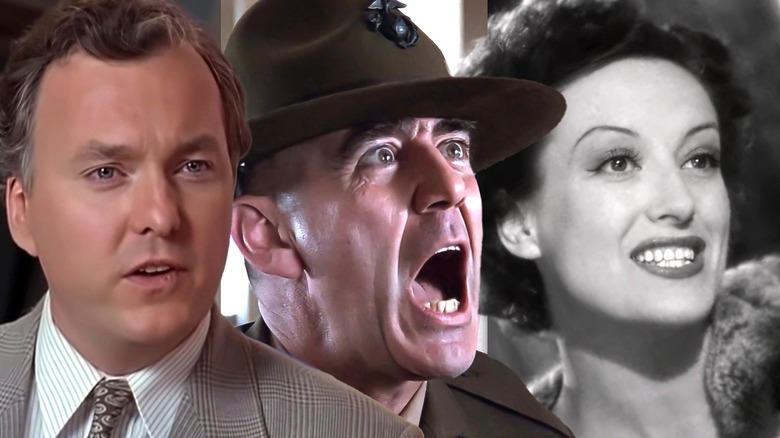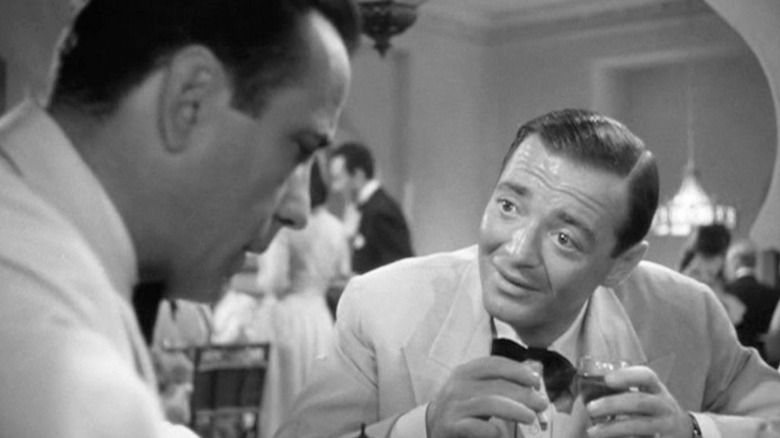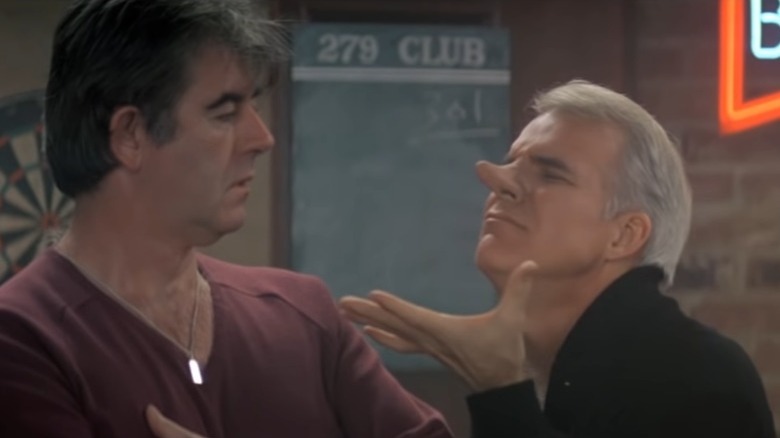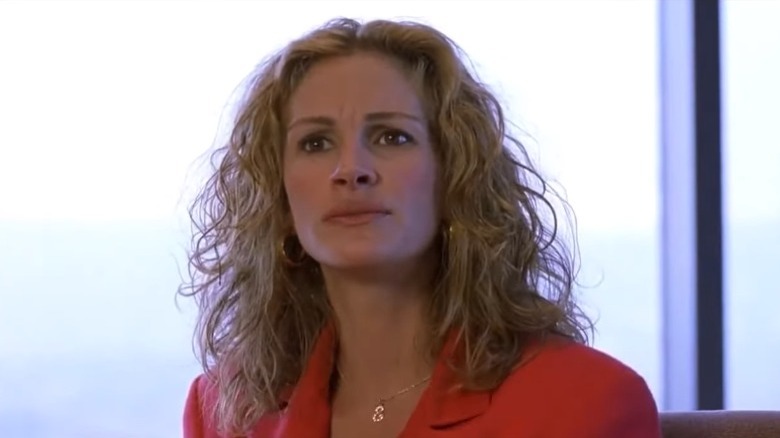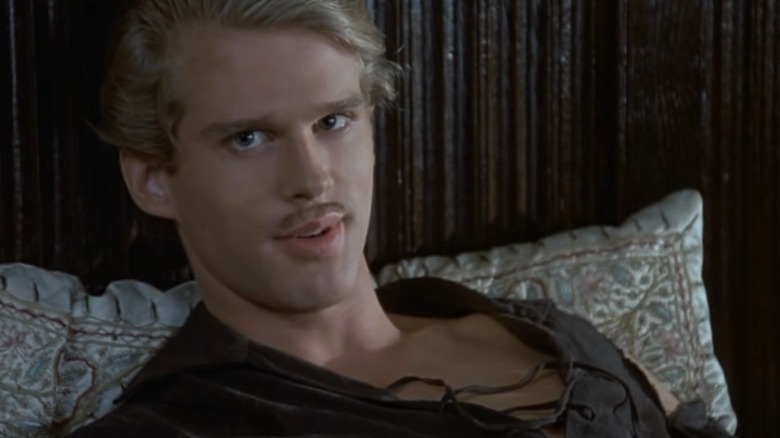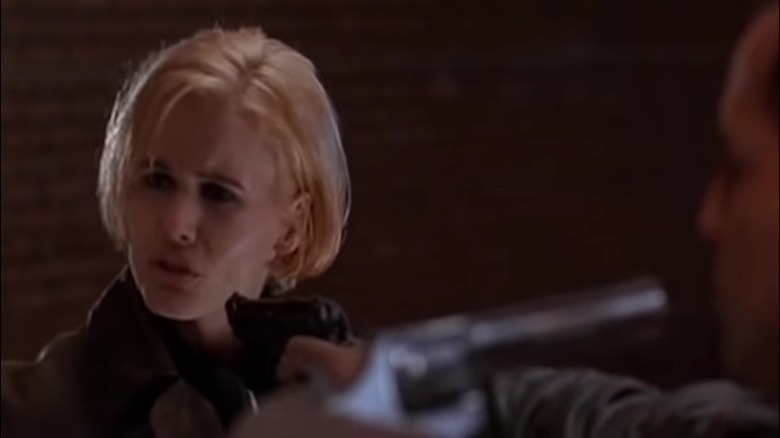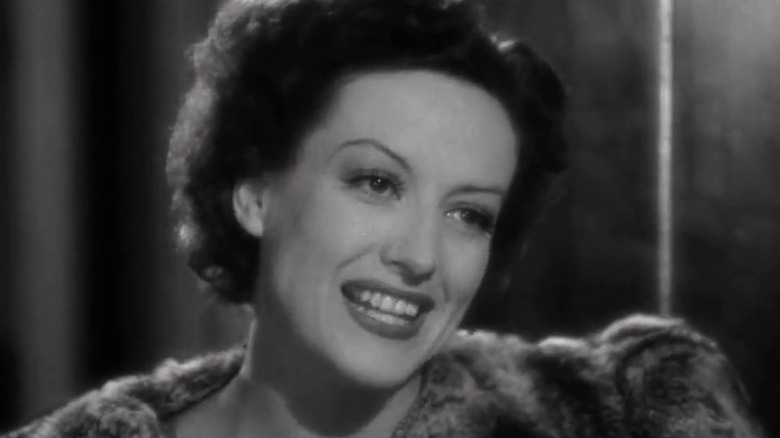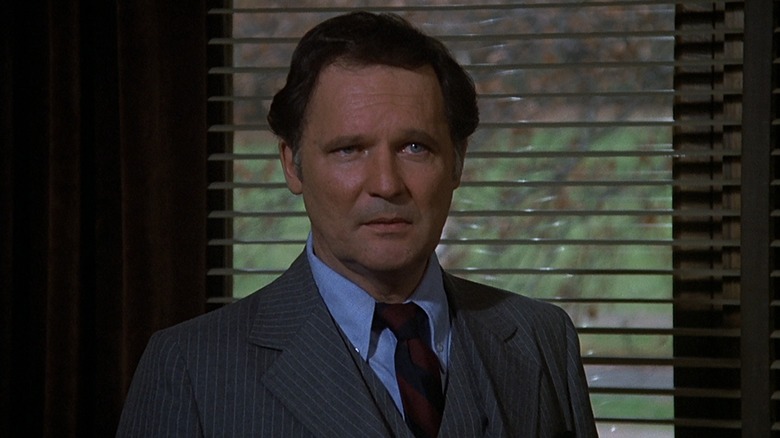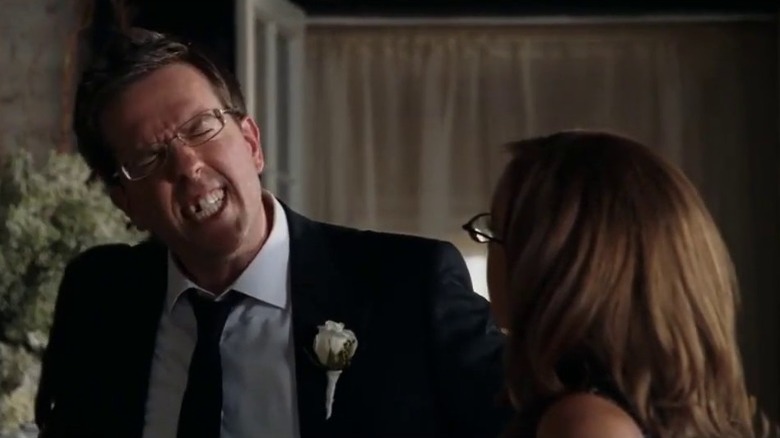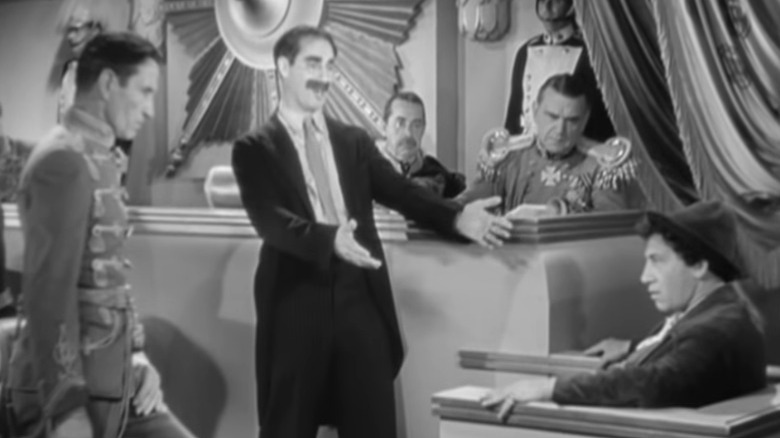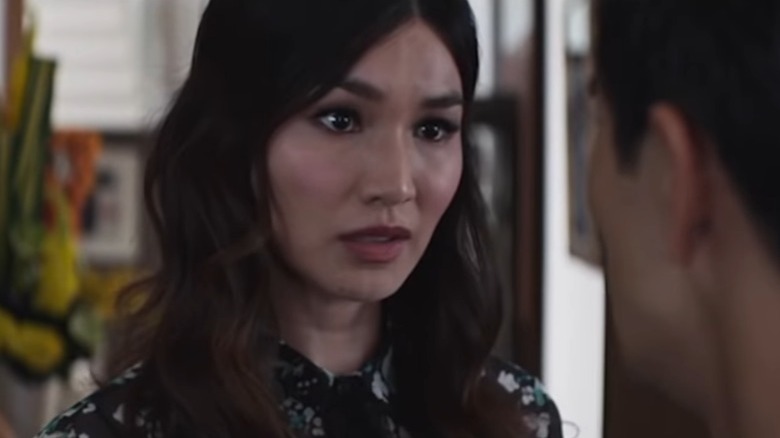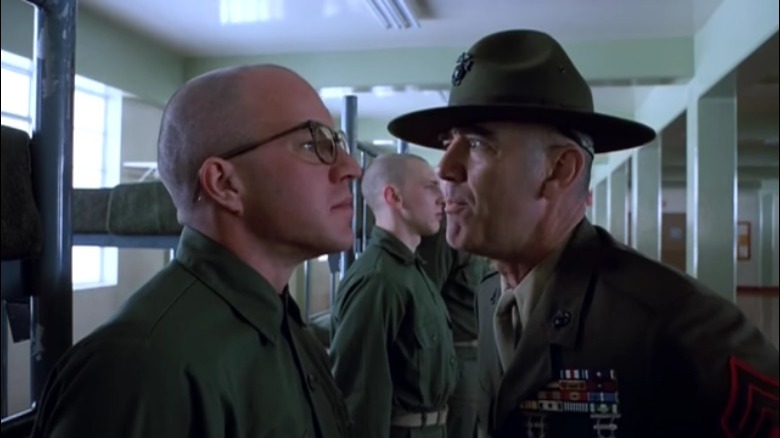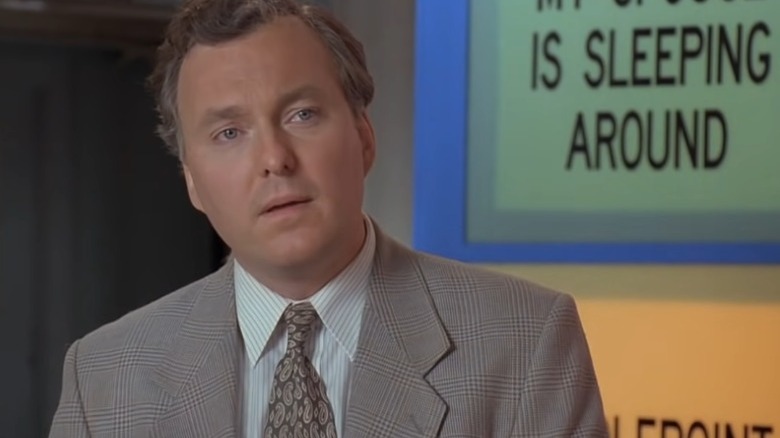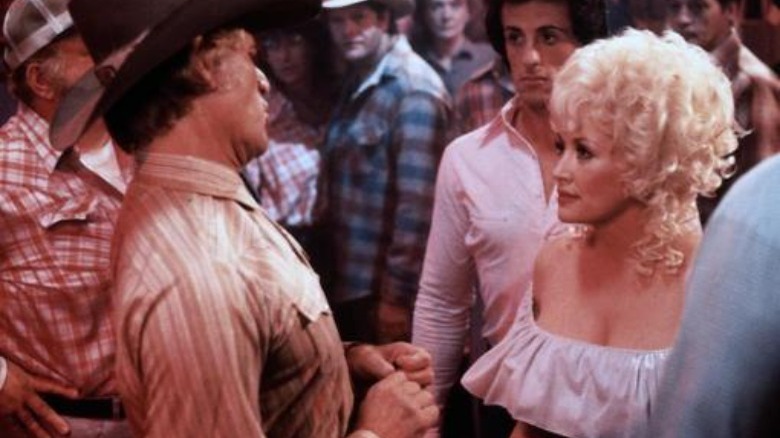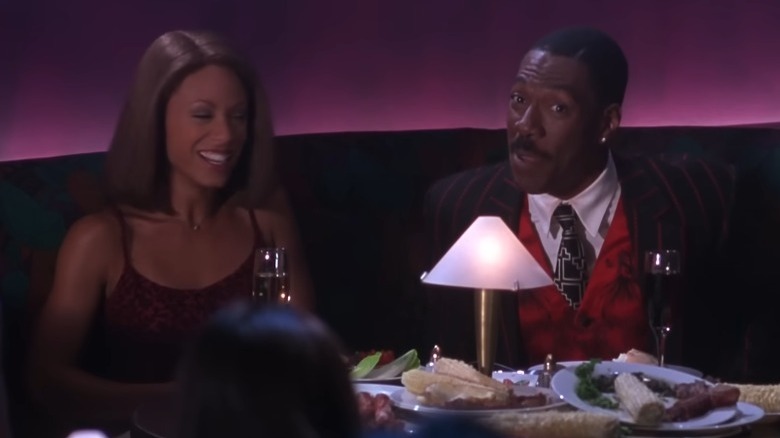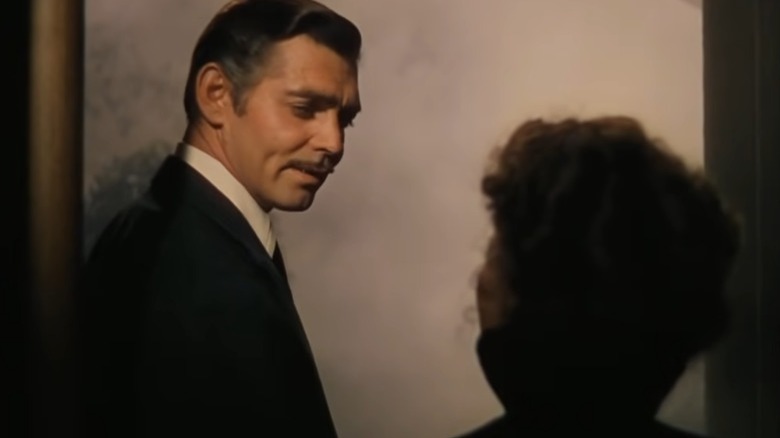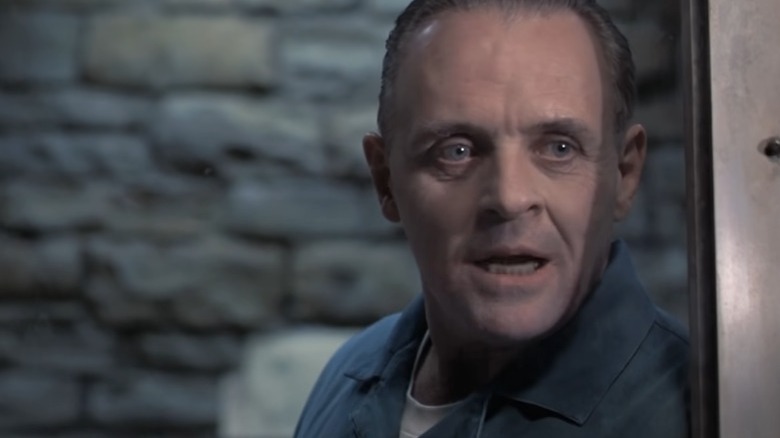The Greatest Movie Insults Of All Time
A good insult can be many things — crass, funny, horrifying, beautiful, anything in between. With clever writing and deft performances, a well-timed diss can elevate tension, inspire a guffaw, or enrich characterization. Some do all three. But whatever the context, the best on-screen insults stand out as memorable movie moments.
For an insult to be considered one of the greatest, it has to stand the test of time. More than that, it must be clever, and while it helps to be funny, it doesn't have to be. If it truly stings and hits the character like a gut punch, odds are you're dealing with a great movie insult. The best aspect of film insults is that they aren't defined by a single genre, and there are plenty in everything from horror and science fiction to drama and romance.
The insults featured here are some of the greatest ever committed to celluloid. Many are well known, while others popped up in movies few have seen. Despite this, they remain some of the greatest movie insults of all time, and no matter who you are, odds are, you wouldn't want to be on the receiving end of any of these.
Casablanca (1942)
Depending on who you ask, there are many movies considered to be the best ever made. If you look around, you'll probably find two films at the top of nearly every list: "Citizen Kane" and "Casablanca." The latter certainly is one of the best movies of all time, but more than that, it features some of the greatest dialogue in movie history. This is the film featuring the line, "If you don't get on that plane, you'll regret it. Maybe not today, maybe not tomorrow, but soon and for the rest of your life."
They just don't write movies like that anymore, and while the majority of the dialogue in "Casablanca" isn't insulting, there's one slam in the film that's so nuanced it's almost poetic. One of the central plots of the film hinges on the acquisition of letters of transit, which a person can use to move freely through German-occupied territory. As we learn in the opening scenes, the letters were carried by two couriers who met an untimely end, and they've been acquired by Peter Lorre's Ugarte, a petty crook.
In one scene, Humphrey Bogart's Rick Blaine plays chess with Ugarte, and the latter asks, "You despise me, don't you?" Without skipping a beat, Rick replies, "Well, if I gave you any thought, I probably would." It's a brief mic drop that could almost get lost in a film filled with so many quotable lines.
Roxanne (1987)
"Roxeanne" is a modern retelling of "Cyrano de Bergerac," with Steve Martin taking the central role as Charlie "C.D." Bales. C.D. has an incredibly long nose, which is a constant point of ridicule by out-of-towners. The locals know and respect C.D., as he is the fire chief, but C.D.'s nose remains a point of derision. Throughout the film, the nose is an inescapable concern for C.D., and while he's aware of his unusual proboscis, he's found ways of living beyond the teasing he received throughout his life.
In one scene, C.D. is at a local bar with some friends when a man named Jim calls him "Big nose." To be sure, C.D. has a big nose, but the insult lacks originality, which is what gets under C.D.'s skin. He remarks on the man's lack of imagination and bets he can come up with better insults based on Jim's dart skills. When Jim hits the 20, C.D. goes to task, providing 20 better insults than his.
This is a rare moment of self-deprecation, where the subject of the insults is also the insulter. While they're all pretty good, these three are arguably the best:
- "Fashionable: You know, you could de-emphasize your nose if you wore something larger. Like ... Wyoming."
- "Humorous: Laugh, and the world laughs with you. Sneeze, and it's goodbye, Seattle."
- "Polite: Ah. Would you mind not bobbing your head? The orchestra keeps changing tempo."
Erin Brockovich (2000)
"Erin Brockovich" tells the story of the real-life activist and her journey from financial hardship to becoming a voice for the people. Brockovich is played brilliantly by Julia Roberts, who took home an Academy Award for best actress for her work. Brockovich is an abrasive woman who isn't concerned with expressing herself whenever she finds it necessary. This helps her get what she wants, but it makes her incredibly difficult to work with, which becomes a problem.
When Ed Masry, Brockovich's boss and the attorney handling a class action lawsuit against PG&E, brings in an outside firm for help, this puts her in a frustrating position. Because Brockovich isn't an attorney, her notes and paperwork don't comply with standard legal practices, causing some issues with Theresa Dallavale, an attorney from the other practice. She asks for more information, and Brockovich doesn't take this well.
After Dallavale posits that they've gotten off on the wrong foot, she's hit with the best insult in the film: "That's all you've got, lady: two wrong feet in f***ing ugly shoes." It's a quip, to be sure, and Roberts perfectly delivers it. To be clear, the film is filled with insults, most of them provided by Brockovich, but the expertise with which she takes down this attorney is so remarkable it's almost admirable.
The Princess Bride (1987)
"The Princess Bride" features plenty of quotable lines, and you'd be hard-pressed to find a fan who doesn't have a list of favorite quotes on-hand whenever asked. The film's greatest line is also the one repeated the most: "Hello. My name is Inigo Montoya. You killed my father. Prepare to die." While it's perfect, it's not an insult. The movie has quite a few insults, most of which are directed at Prince Humperdinck, brilliantly played by Chris Sarandon.
"The Princess Bride" builds to his climactic downfall, but it doesn't play out in the way the viewer may think. Instead of dying at the end, he's insulted. Repeatedly. The climax comes with Humperdinck arriving to fight Westley, but he's lying in bed, so the prince tells him to rise. Without moving, Westley explains how he will defeat his rival "To the pain." He begins by saying, "I'll explain, and I'll use small words so that you'll be sure to understand, you warthog-faced buffoon."
The prince isn't exactly happy about his words, so he tells him, "That may be the first time in my life a man has dared insult me." The first line Westley delivered was an insult, to be sure, but it only works as well as it does because of what he says next: "It won't be the last." He then goes on to describe all the parts of Humperdinck he will remove, leaving the ears so he can hear "every shriek of every child" at his hideousness.
The Long Kiss Goodnight (1996)
"The Long Kiss Goodnight" is an action thriller starring Geena Davis and Samuel L. Jackson. Written by Shane Black and directed by Renny Harlin, the story follows Davis' Samantha Caine, an amnesiac teacher who embarks on a quest to recover her identity after several inexplicable moments through her life off course. To this end, she enlists the aid of private detective Mitch Henessey (Jackson). Incidentally, Jackson called "The Long Kiss Goodnight" his own best movie during an Ask Me Anything hosted by GQ.
Through the course of the film, Caine learns that she's a highly skilled government assassin who disappeared following the onset of amnesia, and her handlers want her back. This explains all of her unusual physical abilities that seemingly come out of nowhere. She and Henessey learn this through some violence and over-the-top action sequences, making for an entertaining film with some good one-liners. In one exchange, Caine is held at gunpoint while Henessey points his weapon at the guy threatening him.
Clearly annoyed with her partner, she asks, "Were you always this stupid, or did you take lessons?" Henessey doesn't pause to think about her question and quickly replies, "I took lessons." It's a brief moment, but it delivers some of the most memorable dialogue in the film. Jackson has been in a lot of movies, and he's delivered some impressive dialogue. While this isn't necessarily comparable to his work in "Pulp Fiction" and other films, it's delivered with such expertise it's difficult to imagine anyone else in this scene.
The Women (1939)
Some of the greatest movie insults come from a time when it was considered risqué to use profanity in a movie. These days, cussing is commonplace, but back in the 1930s and '40s, writers had to craft dialogue without using it, making for some creative turns of phrase. "The Women" is one such film, having been adapted from a play but requiring some tweaking to satisfy the Motion Picture Production Code (otherwise known as the Hays Code), which was the precursor to the MPAA.
"The Women" features more than 130 speaking roles, all played by women, which was unusual for the time. (It's still unusual now, but women were even less represented in movies in the '30s than they are today ... for the most part.) Joan Crawford plays Crystal Allen, and she has the honor of delivering the best insult in the movie. While addressing several women, she says, "By the way, there's a name for you ladies, but it isn't used in high society ... outside of a kennel."
We all know what she meant, as did the viewers in 1939. Regardless, there isn't a better way to call someone a b-word than this line, as it comes off as highbrow while nestled firmly elsewhere. "The Women" is a fantastic example of a film that could have been held back by the Hays Code but found ways to work around it — the insult lands, and everyone understands it. It shows how brilliantly screenwriters Anita Loos and Jane Murfin adapted the source.
Animal House (1978)
"Animal House" is the quintessential college frat film, and it has directly influenced all the films of its niche, many of which attempt to emulate it. Movies like "PCU" and "Old School" take direct inspiration from "Animal House," which isn't surprising, as it's incredibly funny. Granted, it's a product of its time (as all comedies are), but "Animal House" has staying power. It features a brilliant cast, an outstanding script, and brilliant direction — what more could you want?
One of the film's main plot points revolves around Dean Vernon Wormer's decision to put the Delta Tau Chi house on "double secret probation." The fraternity members are the source of all the hijinks on campus, and the dean has had enough. Toward the end of the film, the dean drops the bomb on the frat in his office, where he addresses several of its members directly.
When he turns his attention to Kent "Flounder" Dorfman, he looks at his records, reads that his GPA is 0.2, looks up, and tells him, "Fat, drunk, and stupid is no way to go through life, son." That's not an insult many people can walk away from feeling proud about themselves, but Flounder manages, for the most part. The best thing about this insult is that it isn't delivered like an insult; it's advice from an educator who puts it as matter-of-factly as he can, and because he doesn't hold back, it stings.
The Hangover (2009)
"The Hangover" is an objectively crass film that manages to up the ante with each scene, building to an epic finish. The movie is hilarious, and it's no wonder it earned a couple of sequels. The film features quite a few insults, and while many are exceptional, two are worth mentioning among the greatest movie insults of all time. The first comes from Ed Helms' Stu during a conversation with Zach Galifianakis' Alan about the tiger in their bathroom.
Alan attempts to explain that he can't remember how it got there because memory loss is a side-effect of roofies, to which Stu retorts, "You are literally too stupid to insult." It's not just a great line; it's also relatable. Most viewers have felt like Stu at this moment at least once in their life. While this is easily the funniest insult Stu throws Alan's way, it's not his best — that comes at the end.
Melissa, Stu's girlfriend who is overtly abusive towards him, is giving him an earful, and she goads him into a response. He thinks for a moment and simply says to her, "You're such a bad person. All the way through to your core." This is such a powerful insult because it's honest and palpable — you can feel the sting Melissa feels at this moment, and like his earlier insult, it's relatable. Everyone has had a person like Melissa around them at some point in their lives, and this is a perfect insult for that person.
Duck Soup (1933)
"Duck Soup" is a comedy masterpiece of the pre-Code era and one of the best-known works of the Marx Brothers. While considered to be a classic today, it wasn't a phenomenal success upon release, which is difficult to believe, given how well modern critics and viewers regard it. Regardless, "Duck Soup" features some hilarious dialogue, much of it delivered by Groucho Marx, who primarily directs it at his brothers.
The film is centered around the tiny nation of Freedonia, which has gone bankrupt, so its wealthiest benefactor pushes to have Rufus T. Firefly (Groucho) become its president. The bordering country of Sylvania sends in two spies, Pinky (Harpo) and Chicolini (Chico), to stir things up and begin a revolution. The espionage doesn't go according to plan, leading to several clashes that portend war between the two countries as tensions rise.
Chicolini is caught and put on trial by Firefly, which brings about a fantastic insult. In addressing the court, Firefly says, "Gentlemen, Chicolini here may talk like an idiot and look like an idiot, but don't let that fool you. He really is an idiot." They have some back and forth, followed by Firefly saying, "I wanted to get rid of habeas corpus, but I should have gotten rid of you instead," which elicits an objection from Chicolini, his attorney, and finally Firefly himself, who says, "Even I object, too."
Crazy Rich Asians (2018)
"Crazy Rich Asians" features some of Hollywood's greatest Asian actors and is centered around Rachel Chu, a Chinese American woman who travels to Singapore to meet her boyfriend Nick's family for a wedding. As the title implies, his family is made up of insanely wealthy people, which is a culture shock to Rachel, who had no idea her boyfriend came from such wealth. While much of the film centers on Rachel, Nick's family is comprised of excellent characters played by incredible actors.
Through the course of the film, Rachel gets to know Astrid, Nick's cousin who is married to Michael. Rachel discovers that Michael has been cheating on her, and this leads to an inevitable conflict toward the end of the movie. Astrid confronts her husband about his infidelity, and he blames his affair on their financial disparity, as Michael comes from much humbler beginnings than his wife.
Astrid shows very little emotion when they speak as she informs him that he can keep the apartment since she has 14 apartment buildings and plenty of places to go. Michael stops her before she can leave, and she tells him the problem with their marriage wasn't her family's money; it was because he was a coward. Upon saying this, she comes to a realization and says, "It's not my job to make you feel like a man. I can't make you something you're not." The line is delivered so sincerely and directly; it's almost not even an insult — it's simply their reality.
Full Metal Jacket (1987)
Stanley Kubrick hired a legit Vietnam War-era Drill Instructor to play Gunnery Sergeant Hartman in "Full Metal Jacket." R. Lee Ermey was initially attached to the movie as a technical advisor, but he landed the role after demonstrating his skills at breaking down potential actor recruits. Hartman's rants and insults in the film are taken directly from Ermey's experiences in the Marine Corps, and Kubrick incorporated everything he said into the script. While his dialogue wasn't improvised on the spot, it was all Ermey.
The film opens with Gunnery Sergeant Hartman addressing his new recruits, and he goes on for several minutes, denigrating and tearing them down. Many of his lines qualify for mention here, as they're all perfectly worded and delivered. That said, two exchanges are genuinely iconic, thanks to the authenticity of the film and Ermey's brilliant delivery. The first comes when he addresses Private Cowboy, asking, "How tall are you, Private?" Cowboy replies, "Sir, 5'9", Sir!" Hartman doesn't skip a beat and says, "5'9"? I didn't know they stacked s*** that high!"
It's quick and funny, but it pales in comparison to his best insult, which he delivers to Private Gomer Pyle. Upon seeing him, he asks, "Did your parents have any children that lived?" When Pyle replies that they did, he responds with, "I bet they regret that. You're so ugly you could be a modern art masterpiece!" There are many more gems, but most aren't appropriate for civilized discourse.
Billy Madison (1995)
There's a good chance you've seen a clip of the best insult in "Billy Madison," even if you've never seen the film. That's because it's been memed all over the internet, and is one of the best retorts to an incredibly idiotic statement a character could make. In the film, the eponymous lead is a childish 27-year-old heir to a massive fortune. His father decrees that he will only turn over his hotel company if Billy repeats all 12 grades of school by spending two weeks in each grade.
The rich can set anything up, so Billy heads back to school. Toward the end of the film, Billy is finishing high school when he challenges Eric, the man who would take ownership of the company should Billy fail, to a winner-takes-all academic decathlon. In the decathlon, Billy gives a bafflingly moronic answer to the opening question, which elicits the following response from the school's principal, who is running and judging the event:
"Mr. Madison, what you've just said is one of the most insanely idiotic things I have ever heard. At no point in your rambling, incoherent response were you even close to anything that could be considered a rational thought. Everyone in this room is now dumber for having listened to it. I award you no points, and may God have mercy on your soul." It's bad enough to get torn apart like that, but the last bit is so biblical — it's just harsh.
Rhinestone (1984)
Sylvester Stallone is a talented actor, writer, director, and producer, but if there's one thing most people wouldn't associate him with, it's singing (for good reason). Despite this, Stallone stars opposite Dolly Parton in "Rhinestone," and yes, the man technically sings. Parton plays Jake Farris, a country singer stuck performing at "The Rhinestone" in New York City. She believes she can turn anyone into a country music star, so Jake bets the rest of her contract (and her body) with her boss, Freddie, that she can make it happen.
Freddie chooses Nick Martinelli (Stallone), a cab driver devoid of any and all musical talent. Not only that, he hates country music, but Jake takes him back to Tennessee to turn him into a country star — if anyone can do it, it's Dolly Parton! While in Tennessee, Jake puts Nick through his paces, and they begin to have feelings for one another. Jake's ex-fiancée Barnett doesn't like that, making him something of an antagonist to Nick.
While performing at a country bar in Tennessee, Barnett sits back and heckles Nick, which elicits a rather hilarious zinger from Nick, who says, "You can always tell when Barnett's been over to my house: the toilet ain't never flushed, and the cat's pregnant." The insult hits a little harder when someone in the audience says, "That's old Barnett, alright." The line is great, but the movie is not. Upon release, it was a major flop and is easily Stallone's strangest film.
The Nutty Professor (1996)
"The Nutty Professor" is an Eddie Murphy remake of the classic Jerry Lewis film of the same name. Where Lewis' nutty professor was antisocial and nerdy, Murphy's Sherman Klump is obese, which defines his life in many ways. After developing a formula that alters DNA to make weight loss easy, he drops a whopping 250 lbs. Overnight. Unfortunately, the weight loss brings about an alternate personality who calls himself Buddy Love.
Buddy is everything Sherman isn't: he's confident, he's smooth with the ladies, and he has no problem being at the center of attention. He manages to land a date with Carla Purty, and the two go out to a comedy club headlined by Reggie Jackson, as played by Dave Chappelle. Reggie is one of those "put down" comics who puts the spotlight on the audience and cracks jokes directed at them. Buddy laughs so loudly at this that he interrupts the act.
Initially, Reggie thinks Buddy likes his act, but the tables are turned as Buddy throws several beautifully crafted insults and "yo momma" jokes Reggie's way. Of the many astounding insults in the film, the best is arguably delivered by Buddy at Reggie when he says the following: "Hey man, what's wrong with that breath? I can smell it over here! Reggie, your breath is so stinky, people look forward to your farts." Reggie eventually loses his cool and removes his hat, exposing his horrible hair, then gets the crap beaten out of him to raucous applause.
Gone with the Wind (1939)
Though it's understandably a movie with a controversial legacy, "Gone with the Wind" features some undeniably memorable dialogue. The film is about Scarlett O'Hara, a Southern belle living on a plantation during and after the American Civil War. The film touches on the dawn of war, Scarlett's life through the conflict, and the impact of Reconstruction on the southern states. Throughout it all, she engages in love affairs with two men: Ashley Wilkes and Rhett Butler.
To make Ashley jealous, Scarlett marries Charles, but he's killed in the war. Scarlett's town is left with a lack of eligible men when the war turns sour for the Confederacy, but she marries the wealthy Frank in a bid for stability. When Frank dies, Rhett proposes at his funeral, and she accepts. The couple has a daughter, but Scarlett never gets over Ashley, which Rhett knows all too well. Their relationship is chaotic, to say the least, but remains passionate.
Eventually, Scarlett realizes that she has loved Rhett all along, and she pleads with him to stay. He refuses and heads to the door, ready to leave her and never look back. Scarlett pleads with him, "Where shall I go? What shall I do?" Rhett thinks for a moment, looks at her, and says, "Frankly, my dear, I don't give a damn." Despite being the most memorable line, Hays Code discomfort with the word "damn" meant it almost didn't make it into the film. Still, there's so much history in what Rhett says that his delivery hits Scarlett hard as she realizes the folly of her past actions.
The Silence of the Lambs (1991)
"The Silence of the Lambs" is a master class in dialogue, thanks to the inimitable talents of Jodie Foster and Sir Anthony Hopkins, but especially screenwriter Ted Tally's incredible adaptation of Thomas Harris' novel. The film follows Agent Clarice Starling, an FBI trainee assigned to find and stop a serial killer nicknamed "Buffalo Bill." To aid in her search, she consults with Dr. Hannibal Lecter, a psychiatrist/cannibal/serial killer whose psychological expertise holds the key to unlocking the possible identity of Buffalo Bill, but working with him isn't easy.
He has a history of refusing to cooperate with other agents, so Agent Starling goes into their meeting with her guard up. When they first meet, Dr. Lecter manages to summarize everything about Agent Starling within moments. He delivers an expertly written and spoken monologue that amounts to one of the best insults in cinematic history, as it completely tears down his target. Agent Starling is taken aback by Dr. Lecter's words, and he manages to break through her defenses with expertise:
"You know what you look like to me, with your good bag and your cheap shoes? You look like a rube. A well-scrubbed, hustling rube with a little taste. Good nutrition has given you some length of bone, but you're not more than one generation from poor white trash, are you, Agent Starling?" Ultimately, her strength in the face of his ridicule convinces Dr. Lecter to work with her, and they form a strange and hypnotic attachment while they crack the case.
